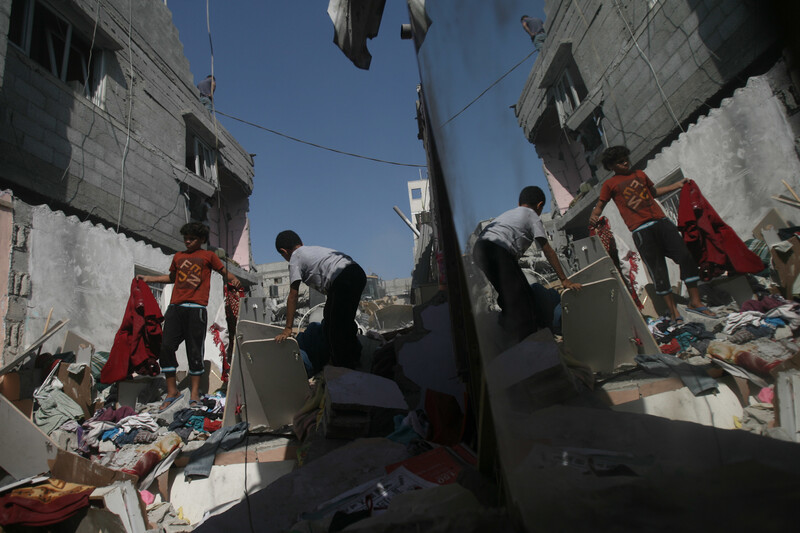Power Suits 10 July 2014

Children collect their belongings from a house destroyed by Israel in the Gaza city of Rafah this week.
APA imagesThe daily press briefing at the European Commission seldom fails to illustrate the cozy relationship between journalists and the powerful. So harmonious is this rapport that many of its attendees “graduate” from being spoonfed stories by official EU spokespersons to eventually becoming spokespersons themselves.
Michael Mann offers a case in point. He used to be on the staff of The Financial Times. Today, he commands a higher salary as a mouthpiece for Catherine Ashton, the Union’s foreign policy chief. Part of his job involves regurgitating Israeli propaganda.
This week he issued a statement which claims that Israel’s latest bombardment of Gaza constitutes “retaliatory fire.” Everything is in response to rockets launched by Palestinians, he suggested.
There is no acknowledgement that Israel has been subjecting Palestinian civilians to collective punishment — in clear violation of international law. There is no mention of the seven-year siege that Israel has imposed on Gaza. There is no recognition that Benjamin Netanyahu’s government has used the murder of three Israeli teenagers as a pretext to kill much higher numbers of Palestinian children in recent days (more than twenty children have been killed in Gaza over the past few days, a death toll that is likely to rise).
Instead, there was an anodyne call for “restraint.”
Bubble
Like most of the Brussels elite, Mann lives in something of a bubble. For the past few months, the main topic of conversation within this cocoon has been which dodgy politician will become the European Commission’s new president. The harm inflicted by the EU’s austerity policies and by its “strategic” partners (as Catherine Ashton has categorized Israel) has been largely ignored.
Diplomats based in Israel live in a bubble, too. The EU’s embassy in Israel is located in a skyscraper in the business district of Ramat Gan, a city beside Tel Aviv. The convivial coffee shops and restaurants which the embassy’s staff frequent provide no clues of the immense human suffering in Gaza, approximately seventy kilometers away.
Lars Faaborg-Andersen, the EU’s ambassador to Israel, ventured a little bit outside the bubble on Monday. He didn’t go to Gaza, however, but to Ashkelon in southern Israel. There, he expressed solidarity with Israelis facing the “unacceptable threat” of rockets from Gaza.
The ambassador elaborated on this gesture of solidarity in a softball interview with the Tel Aviv daily Haaretz. “I wanted to underline that shooting rockets indiscriminately at civilians cannot be a legitimate or an acceptable response to any kind of grievance that you have,” he said.
Listeners to the video of the interview posted on the Haaretz website were spared any explanation of what kind of grievances Palestinians may have.
Awkward fact
The awkward fact that Palestinians have long been treated as laboratory rats for the Israeli arms industry was omitted. That’s hardly surprising, if you delve a bit deeper.
In June, Israel signed an agreement that enables its weapons manufacturers — the very people profiting from the current attack on Gaza — to take part in the EU’s scientific research program. Known as Horizon 2020, that program has been allocated a colossal €80 billion ($109 billion) between now and the end of the decade.
Faaborg-Andersen was so keen to stress his empathy with Zionists that he effectively gave an “up yours” salute to the main Palestinian plea for justice: the 2005 call for boycott, divestment and sanctions (BDS) against Israel. He was at pains to stress that Israel is welcome to continue exporting goods from its settlements in the occupied West Bank, even though some EU governments have recently advised firms against doing business with the settlements.
“The EU is not banning anyone,” he said. “We are against boycotts. We are against BDS. We are against the isolation of Israel.”
Embracing Israel
Far from isolating Israel, some of the EU’s leading representatives appear intent on embracing it tighter. Last month, Daniel Calleja, head of the European Commission’s enterprise department, lead the Union’s second “mission for growth” to Israel in as many years.
Among the Israeli firms which have been involved in this “mission” to increase business with Europe are Elbit, a supplier of the drones now being used to bomb Gaza and of surveillance equipment installed in the apartheid wall declared illegal by the International Court of Justice almost exactly ten years ago.
Ahava, a firm making cosmetics in an Israeli settlement in the West Bank, has been taking part, too.
There is, of course, an important caveat that should be added when the EU claims to oppose boycotts. It is only against boycotts of Israel.
Under US pressure, the Union decided to boycott the Palestinian government formed after the 2006 election. EU representatives, who constantly harp on about democracy, didn’t like the result of that exercise in democracy because the wrong party — Hamas — won.
Those of us who try as best we can to live in the real world detect a heady stench of double standards from EU representatives. The representatives, however, seem oblivious to that stench. I guess that’s what happens when you live in a bubble.
Tags
- European Commission
- European Union
- Michael Mann
- Gaza
- #GazaUnderAttack
- Catherine Ashton
- Financial Times
- collective punishment
- Benjamin Netanyahu
- Gaza siege
- Ramat Gan
- Tel Aviv
- Lars Faaborg-Andersen
- Ashkelon
- Haaretz
- Horizon 2020
- West Bank
- settlements
- BDS
- Elbit Systems
- AHAVA
- Israel's wall in the West Bank
- International Court of Justice
- Hamas





